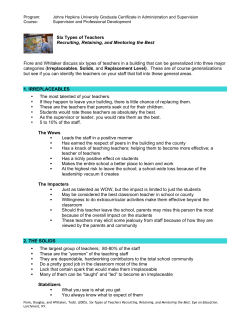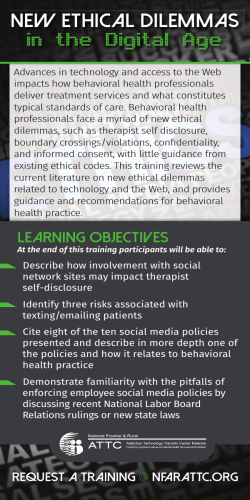
1/13/2011
1/13/2011 Define clinical supervision and its role in promoting self care Define and discuss compassion fatigue Understand off fforming d d the h significance i ifi i a positive supervisory alliance Utilize the supervisory relationship to create professional growth goals Explore the roles of mentoring and effective leadership What kind of supervision have you received? What is your experience as a supervisor? What is your definition of Clinical Supervision? On a piece of paper, write down your definition of clinical supervision F Form groups off 4-6 4 6 and d as a group come up with a definition of clinical supervision that you can all agree on Choose a spokesperson and share your group definition with the rest of the class What is Clinical Supervision? 1 1/13/2011 “A disciplined tutorial process wherein principles are transformed into practical skills with four overlapping foci: Evaluative Supportive Administrative Clinical” Interpersonal Observation Tutorial relationship Evaluation and Skill development Professional growth Learning and practicing Promoting Professional growth and development Protecting the welfare lf off clients l Monitoring counselors’ performance Empowering the counselor to “selfsupervise” This could be due to a lack of time Acquisition of competence Effective patient care Professional responsibilities Powell, 1993 f db k feedback Teacher Evaluator 9 An intensive learning experience 9 Goal setting 9 Performance review 9 Professional development 9 Observe Sounding Board 9 Non-clinical counseling 9 Support and encouragement Consultant 9 Problem solver 9 Ethical and legal monitoring “Empowerer” Mentor 9 Role model 9 Instilling self-efficacy/motivation 9 Coach 9 Encouraging independence 9 Direction and guidance This can also lead to……. 2 1/13/2011 What is it? Secondary Traumatic Stress Burnout Countertransference Vicarious Traumatization Related to emotionally demanding work Emotional/mental exhaustion Includes a loss of passion Precipitating Factors: Workload Institutional stress What else? Similar Si il tto PTSD Occurs when We help a traumatized person We experience behavior and emotions in resulting from knowledge of the person’s traumatizing event A counselor’s response to a client Positive or negative Conscious or unconscious Spoken or unspoken An emotional reaction to the client May be caused by an activation of counselor’s unresolved or unconscious conflicts 3 1/13/2011 Sparked by empathic engagement with a client’s traumatic experience Includes: What resources do you y deal have to effectively with compassion fatigue? A disruption in the counselor’s frame of reference (loss of identity and spirituality) Impact on counselor’s personal life and relationships Reactions and symptoms are similar to those of the client him/herself Small Group Exercise Is Supervision Meeting the Training Needs and Professional Growth of Counselors? What type of compassion fatigue or related reaction is this counselor experiencing? Have you ever experienced any similar reaction? If so, what course of action did you take? What would be most helpful for the counselor in the case study? Hey, I need to talk to you about a case Talk with me while I walk back to my office Is this how supervision can meet the training needs & professional growth of counselors? Professional Growth Greater SelfSelf-Efficacy Improved Client Care Improved Therapeutic Relationships Positive Stress Management Speaking of Stress Management, one could also………. 4 1/13/2011 ….But we also need to change the Paradigm “Successful agencies purposefully changed their language from ‘we have to do this this’ to ‘the the client is the most important reason we are here’” Pamela Mattel, ACSW (on clinical supervision) Change is a Significant Component of Clinical Supervision Thoughts about Change in Collaboration: Collaboration is about connecting Change happens from compassion, not from expertise in a particular philosophy Supervision is about quality of attention A supervisory alliance leads to change Forming a Supervisory Alliance is the Key to: A High level of trust Increased selfself-efficacy Increased comfort Self Self--motivation Self Self--identification of internal resources for change Greater selfself-knowledge However….. 5 1/13/2011 Good supervisors slow people down to the speed of wisdom Knudsen, Ducharme, & Roman, 2008 Issue: What is happening behind the closed door? Assumption: Practice conforms to policy, policy procedure, procedure and clinical protocol Verification: Rarely happens Reality: Clinicians lack performance feedback and mentoring ….Or how do I really know what goes on behind those closed doors? Direct observation of counselors is the only way to see the whole picture Observe Provide feedback Mentor/coach/teach Evaluate Motivate Inspire Create an atmosphere for continuous learning 6 1/13/2011 Mutual assessment Tasks necessary to reach goal Shared vision and Written in behavioral terms expectations Focus on what is possible Direction for skill development Specific action steps Expectations for supervision Ownership of goals Leading to professional growth ¾ Passion and motivation ¾ Confidence and self-efficacy Specific Measurable Attainable Results-Oriented Time-related Updated as needed New goals added Achieved goals noted Modified to fit progress Bottom line: Less stress and greater self--satisfaction self What are your goals? Write 2 or 3 professional goal Include “SMART” action steps How might these improve your well being? Is there someone who can assist you in finalizing your goals? Do you have a mentor? Who are your mentors? Exercise and discussion 7 1/13/2011 A relational experience where one person empowers the other by sharing: 9Resources 9Wisdom 9Experiences Mentoring programs at work Fast track training programs Leadership training (ATTC Leadership Institute) 9Perspective.. and does so with encouragement Informal mentoring Face to face or at a distance The reality of great leadership is more basic than leading through strategy, vision, or powerful ideas: Initiated by either party Known or unknown A spiritual relationship “Greatt lleadership “G d hi works k through the emotions.” May include: ¾ ¾ ¾ ¾ ¾ Coach Guide Role model Teacher Counselor From Primal Leadership, by Daniel Goleman (2002) Mentoring brings “possibility to others … from any chair, in any role.” Zander & Zander, The Art of Possibility (2000) Successful Clinical Supervisors have the following strengths: “The ability to manage our own emotions and our inner potential for positive relationships” Self-awareness Self-management Self-motivation Social awareness Relationship management From Social Intelligence, by Daniel Goleman (2006) Can these be learned? YES! 8 1/13/2011 Promote open and honest communications Promote an environment that values diversity Allow free access among all throughout the organization Create C t a trusting t ti and d open environment i t Develop organizational values that bring people together Honor collaboration Allow people speak truthfully to one another *from Leadership and the New Science by Margaret Wheatley (2006) Power: the ability to influence or control others* Authority: the right to control others others* Leadership: the ability to use authority to make others powerful** *Alfred Kadushin and Daniel Harkness Supervision in Social Work (2002) **Ben Zander & Rosamund Zander, The Art of Possibility (2000) A healthy supervisory relationship Relief from compassion g fatigue Professional growth Increased self awareness High self-efficacy The potential for positive emotional intelligence And……. 9 1/13/2011 Additional resources: www.attcnetwork.org www.samhsa.gov www.danyainstitute.org 10
© Copyright 2026











